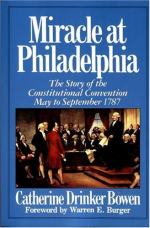
|
| Name: _________________________ | Period: ___________________ |
This test consists of 15 multiple choice questions and 5 short answer questions.
Multiple Choice Questions
1. Which delegate wishes to establish a national university supported by Congress?
(a) Alexander Hamilton.
(b) James Madison.
(c) Elbridge Gerry.
(d) George Washington.
2. Which delegate argue that restrictions on the citizenship of legislators are left for Congress to decide?
(a) Edmund Randolph.
(b) Robert Morris.
(c) James Madison.
(d) Charles Pinckney.
3. Who finally appears at the Convention a week after the Great Compromise is passed?
(a) The delegation from Kentucky.
(b) Thomas Jefferson.
(c) The governor of New Jersey.
(d) Two delegates from New Hampshire.
4. What are the Federalist Papers?
(a) A series of articles published in New York newspapers against the ratification of the Constitution.
(b) The published version of Madison's notes from the Convention.
(c) The published version of Washington's description of the Convention.
(d) A series of articles published in New York newspapers supporting the ratification of the Constitution.
5. Which delegate proposes that the positive vote of seven states constitutes ratification of the Constitution?
(a) David Carroll.
(b) Pierce Butler.
(c) James Wilson.
(d) James Madison.
6. Which delegates is NOT a member of the Committee of Detail?
(a) Edmund Randolph.
(b) James Wilson.
(c) Nathaniel Graham.
(d) Rufus King.
7. What does Widgery do after the Constitution is ratified by the Massachusetts Convention?
(a) He pledges to continue fighting against the principles outlined in the Constitution.
(b) He writes a series of newspaper articles decrying the result.
(c) He travels to New York to support the opposition by members of that state.
(d) He pledges to uphold the decision of the Convention and sow seeds of union and peace.
8. Where does the Constitution go after it is signed in Philadelphia?
(a) To state governors for their approval, then to Congress.
(b) To Congress for ratification.
(c) To the individual states for ratification.
(d) To Congress, who recommends it to the states for ratification.
9. Who founded the Ohio Company and sells shares to congressmen?
(a) Elbridge Gerry.
(b) James Wilson.
(c) George Washington.
(d) Manasseh Cutler.
10. What are foreign visitors to America surprised they don't see more frequently?
(a) Forests and trees.
(b) Poverty among white men.
(c) Slaves.
(d) Deer and wild life.
11. Which state has the largest delegation present at the end of the Convention?
(a) New York.
(b) Pennsylvania.
(c) Virginia.
(d) Massachusetts.
12. What is the last major issue Convention delegates consider?
(a) The procedure for electing a President.
(b) The way the states are represented in the new legislature.
(c) The way the Constitution is ratified.
(d) The method for electing state legislatures.
13. Who is named amanuensis for the Committee of Style and Arrangement?
(a) William Samuel Johnson.
(b) Alexander Hamilton.
(c) Governor Morris.
(d) James Madison.
14. By August 30th, what date has been set for the final adjournment?
(a) September 1st.
(b) August 31st.
(c) September 31st.
(d) No date has been set.
15. What is the delegates' decision regarding the location of a fixed seat for the national government?
(a) Government continues moving between major Eastern cities.
(b) A new area, known as Washington, is created.
(c) The decision is left to Congress.
(d) The first President chooses where government is located.
Short Answer Questions
1. Which state has only one delegate sign the Constitution?
2. Why are Philadelphia's artisans and mechanics in favor of the Constitution?
3. Why is it necessary for the Western Territories to have an ocean port?
4. Why does the Convention need to end by September?
5. Why are French noblemen amazed to find Revolutionary War officers working as innkeepers?
|
This section contains 684 words (approx. 3 pages at 300 words per page) |

|




